#+ have a good conscience
Explore tagged Tumblr posts
Text
OOPS I DIDNT REALIZE THEY WERE MDNI I JUST SAW IT ON MY FEED AND STARTED GUSHING 😕 deleted it im sorry!!!!! sav stfu and check profiles before spilling your guts in reblogs hello
#sav's journal#so im gonna like#say some of the stuff i had on that rb in these tags for yall bc that post was rly nice to see#you are NOT a bad person#stop convincing yourself otherwise#the very fact that you're feeling remorse for your previous actions and thinking that those actions make you a bad person?#such a big sign that you're a good person#+ have a good conscience#so!!!#you're awesome#please don't think of yourself as a bad person#cause you're not#we all make mistakes and it will happen again and again and again thats just life#cause GIRL me too i make way too many mistakes (this post is a result of me making a mistake!! shocking!!)#you're awesome <3#have an amazing day/night and take care of yourself today!!#ok bye
6 notes
·
View notes
Text
with the pain scale poll making the rounds on chronic illness tumblr, i DO want to add the caveat that you Generally Should Not use that scale with unfamiliar doctors.
like, if you gotta go to urgent care or the ER for something related to your illness. Do Not Use A Reasonable Scale.
on the scale i wrote, a 5 (exact middle of the scale) means, "i am actually crippled from this pain and unable to live my life normally, BUT i retained the ability to drive here and walk inside unassisted."
PEOPLE WITHOUT CHRONIC ILLNESS REPORT THAT AS A 10.
for the majority of people without chronic pain, ANY pain that's significant enough to go to urgent care counts as a 10. i've been reliably told by EMTs and paramedics and nurses that they often get answers of "11" or "700" when asked to rate between 1 and 10.
when a doctor hears you say 5, they think, "ah, so this pain is mild and not distressing. it's just a little annoying." ie: about a 2 on the scale i wrote.
always, always, ALWAYS up your estimate by 3 or 4 points when you're interacting with a new doc. you MUST communicate, "this is urgent and needs urgent attention."
assume everyone else gives a 10 when they've badly pulled a muscle in their lower back. adjust your estimate around that.
#cant in good conscience NOT say this since we're on the autism website & the overlap with autism and chronic illness is so real.#That Scale Is Not Prescriptive.#medical#sidenote if you have a very good doctor who's familiar with you then you can adjust#at one point i had a doc with whom i was honest about things being like a 7 when they were severely disabling.#as a result... the one and only time i ever told her i was at a 10. she was immediately like okay. i am prescribing opioids Right Now.#no question about it no worries about whether i was 'really' in pain and no concerns about drug-seeking. just immediate medical care#what a blessing. having a doctor like that is a privilege though!#chronic illness#chronic pain#autoimmune tag#ehlers danlos life#etc
1K notes
·
View notes
Text
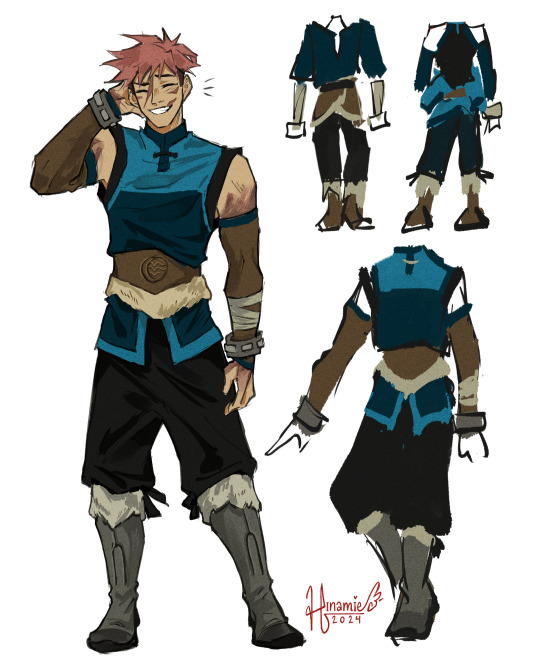
took 3 tries but i think i am finally free of korra plagiarism in yuuji's water tribe design
jjk atla!au with @philosophiums
#my art#jujutsu kaisen#jjk#itadori yuuji#yuuji#fanart#jjk fanart#jjk atla!au#lmhs#timelapse#atla!au: design#atla!au: art#this au's power....literally ws like I Do Not Have Time To Draw today and yet . here he is#I think water tribe clothing leans symmetrical thus me fiddling w his lower hem a bunch ghgjhfgsdf#i love u asymmetry but we must make sacrifices ive spent too long bashing my head in over how to fix this design#i simply could not in good conscience have him cosplaying korra . i think their time in th water tribe is too important#n when the time comes fr me to illustrate fr th later chapters i want to . u kno.#actually be Happy with th design GJHFGS#and i am !!!! finally !!!!#i think i managed 2 accomplish my goal of keeping his short sleeves n armbands while Not making it look like walmart korra#long suffering sigh yuuji Why Do You Fight Back :(#megumi voice whatever !!!!#my un-korrification mission ws a success in my eyes and thats all that matters
903 notes
·
View notes
Text
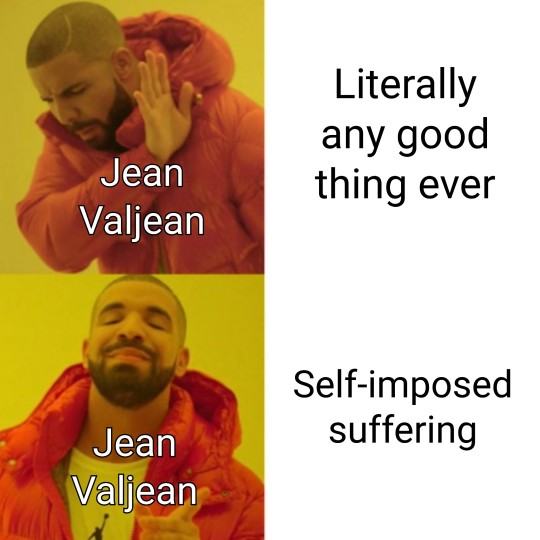
jon val jon or something
#jean valjean#les miserables#les mis#meme#no bc i just read the part where FIRST of all he's 'so happy his conscience began to bother him' and immediately goes 'can't have that'#and then he 'lived in the backyard like a dog' OF HIS OWN HOUSE WHILE COSETTE IS IN THE MAIN BUILDING#and jvj my beloved i am obsessed with you king but it is SO unhealthy to intentionally deprive yourself just so someone else can tell you..#'no no don't do that you need to take care of yourself' like bro i know you want to be nurtured and have someone prove their love for you#but it's really not great that the only way you keep your room at a liveable temperature and eat good food is when cosette is making you#i say this without judgement bc that was me once too but good GOD man your identity cannot be her!!!!#and stop with the preemptive self-inflicted harm!!! stop with the self-protective and yet -destructive distancing!!#you're only doing that because you want someone to tell you to stop!!!!!#alternate chapter title: in which an old man finds himself at home among the youth (2014 tumblr)#ANYways all this to say jvj is a projectable 10000% and i hate him because i love him because i hate that version of me bc i love me#or: SHUT UP AND BE LOVED YOU SILLY OLD MAN!!!!!!!!!!!!!!#kay has a party in the tags#kay can i just catch my breath for a second#kay is a classical literature nerd#my meme
208 notes
·
View notes
Text
if we go by the theory that some number of the people who come to fromville are reincarnations of the original townspeople who are destined to come back again and again until the children are saved (jade, tabitha) and others are basically unlucky bystanders in their current life who get trapped with them (jim) then let’s think about other characters. namely, i agree with the theory that abby was maybe someone who was reincarnated. it’s implied she dreamed of the town when she was a child, and what was her final act? she was about to kill her son, believing she was doing the right thing (an echo of the event that kicked all of this off, something that would have ensured everyone was doomed until the next cycle because no one is free until the children are saved) but she couldn’t. because boyd, someone outside of the cycle, stopped her.
i’m quite enamored with boyd as a character who fights desperately against fate. he is adamant about how he refuses to be broken by the town, and although he knows some things like his Parkinson’s are inevitable, others he feels compelled to change. but the thing is, if my theory holds, he never should have been there at all. he was a total rando who got sucked up into this cycle of death and reincarnation and horror but he started to make things different. he made a difference in people’s lives, and most significantly, he stopped the story from repeating itself. what if jade and tabitha need someone like him to truly end the cycle - someone who was never involved in the first place but tries so fucking hard now that he’s a genuine threat to whatever controls fromville? i mean, why else would this place try so hard to break him if he didn’t pose a danger to the evil there? sure, it’s a very petty evil, who likes a cheap shot, and he did directly challenge them. but i think boyd needs to find tabitha and jade asap because i really believe he might be the key they’ve been missing in each round
#and now we need to wait two years to see if this holds up#this is my Boyd Ode although after this last episode. hoo baby. town might’ve got him a little#it’s so brutal to see the effects that this seasons events have had on him#we are far far past the boyd who could barely confine someone to the box#and beyond just the measured cruelty of what he did to elgin it’s also like. he’s so terrified that he’ll lose the last bit of family he has#from being forced to watch with tian-chen and seeing fatima suffer and like. idk it just shows this is a man truly on the brink#khatri was so damn good as the ghost of conscience i hope we get him in s4#from spoilers#from mgm
111 notes
·
View notes
Text

firstlovelatespring.mp4
#another unposted doodle#love listening to my kat and everlark playlists to hurt myself#something about katniss having to carry the whole world at 16/17 and taking care of her family since 12#and never experiencing being carefree and youthful joy until shes an adult#can you tell shes in a meadow#my art#sketch#katniss everdeen art#katniss everdeen#thg#thg katniss#thg art#thg fanart#REALLY OLD but someone on two asked for vault art#there’s also a toasting piece but itsbsooooooo bad i can’t in good conscience even post the sketch
92 notes
·
View notes
Text

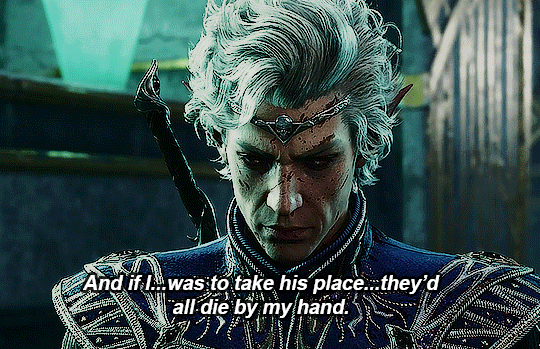
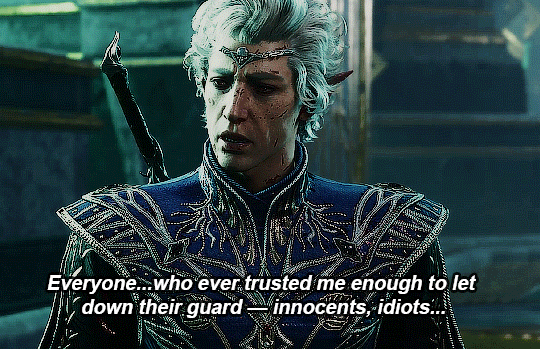
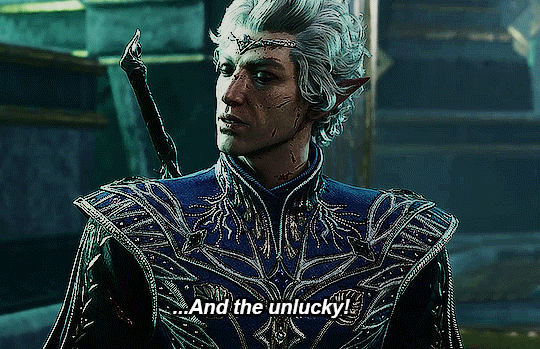
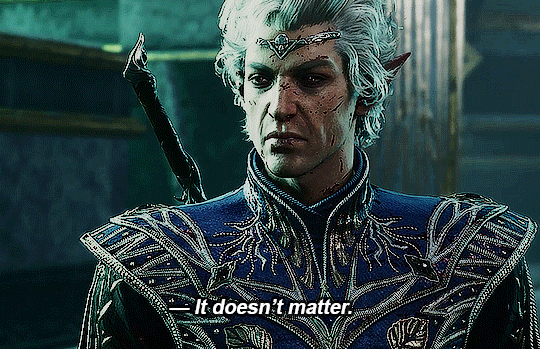
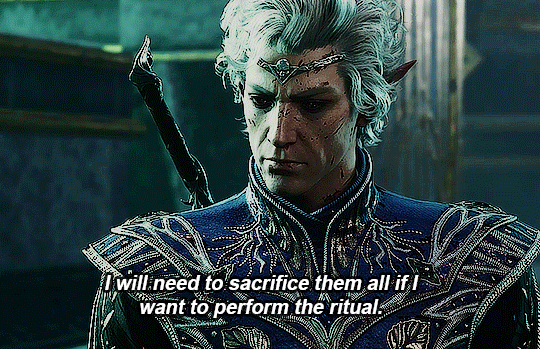
I feel ill. All the fools and villains who ever fell for my ploys, they're — they're here!
#gamingnetwork#vgedit#videogameedit#gamingedit#dailygaming#gameplaydaily#bg3edit#bg3#bgedit#bg3 astarion#astarion#astarion ancunin#:(#i think this scene is so interesting and speaks to why i get so annoyed by the 'any portrayal of astarion#as having an degree of a conscience or goodness in him is stupid and woobifying. hes chaotic evil and thats IT' thing#the grief and guilt. the way he tries to talk himself into it. the way he removes HIS OWN autonomy to do it. pretends theres no other choic#esp in the context of other moments where he preens when hes called good. he LIKES being smth other than what cazador made him#but hes so SCARED. he spends this dialogue talking himself into killing them and he HAS to talk himself into it BECAUSE this kind of evil#isnt easy to him despite it all. theres still scraps of a conscience there yknow? and he hides it from himself by pretending hes less free#astarion is fun BECAUSE hes weird and contradictory and a bad person with the capacity 4 good. BECAUSE he doesnt know what he actually want#also i love the idea of him in this moment rly thinking abt the player....like whether theyre friends or romances#a player whos been really kind and loving to him...kept him safe....trusted him....#thinking about how they let their guard down for him and how in his old life THIS would have been the life#hed been damning them to....years and centuries in a tiny cage somehow even worse than his
298 notes
·
View notes
Text
Edit: I removed the screenshot so as not to share dm stuff, but I got a message from someone who couldn't send an ask, inquiring: "i was wondering what book it was that you mentioned about the philippines? i'd be interested in reading it"
Sorry to post; figured it would be a subject worth sharing with interested others. Good news: It's an article, so it's relatively easier to access and read.
Jolen Martinez. "Plantation Anticipation: Apprehension in Chicago from Reconstruction America to the Plantocratic Philippines" (2024). An essay from an Intervention Symposium titled Plantation Methodologies: Questioning Scale, Space, and Subjecthood. Hosted and published by Antipode Online. 4 January 2024.
Basically:
Explores connections between plantations in US-occupied Philippines and the policing institutions and technologies of Chicago. Martinez begins with racism and white anxiety in Chicago in the 1870s. Coinciding with Black movement from the South during Reconstruction and the Great Migration, Chicago was, in Martinez's telling, a center of white anxiety and apprehension. Chicago public, newspapers, and institutions wanted to obsessively record information about Black people and white labor dissidents, including details on their motivations and internal/inner life. Between 1880-ish and 1910-ish Chicago then became a center of surveillance, records-keeping, classification systems, and new innovations in monitoring dissent and collecting information. Within a year after the labor rebellions, the Adjutant General of the US Army who led Chicago's militarized crackdown on the 1877 Great Railroad Strike immediately moved to DC and proposed establishing "the Military Information Division" (MID); eventually founded in 1885, MID started collecting hundreds of thousands of Bertillon-system intelligence cards on dissidents and "criminals." Meanwhile, National Association of Chiefs of Police headquartered their central bureau of identification (NBCI) in Chicago in 1896. At play here is not just the collection of information, but the classification systems organizing that information. The MID and related agencies would then go on to collect mass amounts of information on domestic residents across the US. In Martinez's telling, these policing beliefs and practices - including intelligence cards, "management sciences," and policing unit organization - were then "exported" by MID to the Philippines and used to monitor labor and anticolonial dissent. Another Chicago guy developed "personality typing" and psychological examinations to classify criminality, and then trained Philippines police forces to collect as much information as possible about colonial subjects.
The information-gathering in the Philippines constituted what other scholars like Alfred McCoy have called one of the United States' first "information revolutions"; McCoy described these technologies and practices as "capillaries of empire." Martinez suggests that it's important to trace the lineage of these racialized anxieties and practices from Chicago to the Philippines, because "such feelings were fundamental to linking plantations which at first seem so spatially and temporally distant." And "[u]ltimately, the US colonial plantocracy in the Philippines built its authority around information infrastructures [...] and feelings emanating from Chicago [...] that extended from the image of the American South."
Side-note:
The Bertillon system was standardized at about this same time, 1879-ish, and in similar social and racial contexts, becoming popular in other Midwest/Great Lakes cities, especially to track Black people (though it was also rapidly and widely adopted famously as an essential approach across Europe). The system used body measurements to identify and classify people, especially "criminals," significantly involving photography, such that Bertillon is also sometimes credited as the originator of "the mugshot."
I'd add that the aforementioned police chiefs National Bureau of Criminal Identification (NBCI) stayed in Chicago from 1896 until 1902, when the killing of President McKinley frightened officials with potential of wider popular communist/labor movements; at that point, it was moved to DC, as William Pinkerton (co-director of the Pinkerton agency) donated the agency's photograph collection to build the new bureau, and NBCI strengthened itself by collecting Bertillon-style fingerprints and became the precursor to the FBI, founded 1908. (After 1895-ish especially, European authorities were transcending their petty rivalries to attempt forming international police agencies and share documents, tracking each others' domestic radicals/dissidents.)
You could compare the colonial use of Bertillon-style intelligence card systems in Chicago and US-occupied Philippines to the rise of fingerprinting as a weapon of Britain.
Edward Henry was the Inspector-General of Police in Bengal, appointed 1891, basically the top cop in British India. He exchanged letters with notorious eugenicist Francis Galton, wherein they specifically talked about the importance of developing a classification system for fingerprints that could be used alongside the Bertillon system of anthropometric identification. (Another British imperial administrator in India, Sir William Herschel, had previously been the first to pioneer fingerprinting by taking hand-prints.) By 1897, police forces in India had been adopting the so-called Henry Classification System, and the Governor-General of India personally decreed that fingerprinting be adopted across India. By 1900, Henry was sent to South Africa to train police in classification systems. By 1903, Henry was back in Britain and became head of the Metropolitan Police of London, now the top cop in Britain. (Compare dates with US developments: British police in India adopt fingerprint identification system the same year that Chicago police found their proto-FBI central identification bureau. Less than a year after the US head-of-state gets killed, Britain super-charges the London police.)
So, the guy who pioneered fingerprinting classification for use in maintaining order and imperial power in India and other colonies was eventually brought in to deploy those tactics on Britons in the metropole. The kind of colony-to-metropole violence thing described by many theorists. Britain also developed traditions of police photography in context of rebellions in Jamaica and India to collect personally identifiable information and track dissent. The Ottoman Empire cultivated a system of passports and related laws to monitor and direct movement; France did something similar in colonial Algeria.
And Great Lakes cities, after the Great Migration, were notorious for this kind of police violence. Consider how the Bertillon system was used early-on by Minneapolis police to track and target Black "alley workers" (try keyword-searching "Minneapolis Bertillon alley workers"). Or how Chicago was a focal point of antiblack violence in the Red Summer of 1919. Or how Milwaukee has some the most distinct Black-white segregation of any large urban area in the US. Or how, after Elliot Ness lionized law enforcement officials in Chicago during the Al Capone case, he then led policing operations in Cleveland culminating in the mass eviction and the burning of Kingsbury Run shantytown. (Chicago is like a funnel, a node, a hub. Especially after the 1860s: Center of railroad networks. Center of telegraph networks. Destination for Texas/Kansas cattle shipped to Chicago meatpacking houses. Destination for Corn Belt prairie agricultural products. Hence the 1893 Columbian fair and Chicago's turn of the century image as a modernist metropolis. So they had to keep the laborers in line.)
Anyway, the other story that I mentioned regarding Philippines was from:
Gregg Mitman. "Forgotten Paths of Empire: Ecology, Disease, and Commerce in the Making of Liberia's Plantation Economy." Environmental History, Volume 22, Number 1. January 2017.
For context, I'd note that this takes place in the midst of the US's "conquest of the mosquito" in its militarized occupation of Panama, where the canal was completed in 1914.
In Mitman's story, Richard P. Strong was appointed as director of the brand-new Department of Tropical Medicine at Harvard in 1913. Shortly thereafter in 1914, as he toured plantations in Panama, Cuba, Guatemala, etc., Strong simultaneously took a job as director of the Laboratories of the Hospitals and of Research Work of the United Fruit Company (infamous for its brutal labor conditions in plantations, its land-grabbing in Central America, and its relationship to US corporate power). Harvard hired Strong partially on the recommendation of General William Cameron Forbes, who was the military governor of US-occupied Philippines from 1909 to 1913. When Harvard hired Strong, he had been living in the Philippines, where he was the personal physician to Governor Forbes, and was also the director of the Philippine Bureau of Science's Biological Laboratory, where he had experimented on Filipino prisoners without their knowledge; Strong fatally infected these unknowing test-subjects with bubonic plague. Then, Governor Forbes, after leading the US occupation of the Philippines, himself became an overseer to Harvard AND a director of United Fruit Company (also Forbes was a banker and the son of the president of Bell Telephone Company). Meanwhile, Strong also became a shareholder in British rubber plantations; Strong approached Harvey Firestone to help encourage the massive rubber company to negotiate a deal to expand plantations in West Africa, where Firestone got a 99-year-long concession to lease a million acres of land in Liberia. So there's an intimate relationship between military, plantations, colonization, academic funding models, corporate profiteering, land dispossession, etc.
---
So, in each case, the plantation expands in time and space. There is imperial anxiety about the threat of potential subversion from recalcitrant laborers. Imperial authorities cooperate and learn from each other. The rubber plantation owner is friends with the military guy, who's friends with the laboratory technician, who's friends with the railroad developer, who's friends with the cop, who's friends with banana plantation owner. There are connections between the exercise of power in the Philippines and Panama and West Africa and Bengal and Chicago. Connections both material and imaginative.
Disturbing stuff.
#sorry for all this rambling#and sorry for removing image i just cant in good conscience bring myself to share screenshot of private message someone has sent me#even if a message may have been meant as part of or adjacent to amicable public discussion#tidalectics#intimacies of four continents#geographic imaginaries#ecologies#multispecies#plantationocene and plantations i guess idk#black methodologies#indigenous pedagogies#my writing i guess#archipelagic thinking#abolition
67 notes
·
View notes
Text
Another bit on the pro-Pal fandom, this one axiomatic
Being a good person is not the same thing as pretending as though you believe you are a good person.
Being a good person takes work. You have to do stuff. Doing stuff is hard. Doing good stuff is harder, because you have to put thought into determining what you think is good beforehand. That requires self-reflection, honesty, a willingness to challenge oneself, and taking in information from other people to verify that your concept of "good" is, well, good.
The nice part is that once you evaluate what is good and start doing good things, it becomes easier. You gain inner calm, peace, and even joy.
("Good" is not always the same as "necessary". Necessary work can be a slog, or it can be horrific. But there can still be a calming satisfaction at the core, the security that this is necessary and therefore worthwhile.)
Pretending to believe you are a good person takes less immediate work. You don't have to do anything that positively impacts the real world, and you don't have to do any of that annoying, time-consuming self examination. But in the long run, it's more exhausting. By far.
You are insecure about whether or not you are a good person. You're pretending to believe you are good. You can't feel secure in something you pretend to believe. That insecurity gnaws at you, especially when you engage in bad behavior--harassment, doxxing, posting gore, swarming tags, encouraging and promoting suicide among your fellow "activists", telling your opponents to kill themselves, stalking, spamming unrelated content with literal Nazi propaganda.
None of those are good things good people do. And you understand that. You would think someone was bad if they did those things to you. The cognitive dissonance between who you want to be and who you really are, as determined by your actions, is scary. It's painful. It rears up every time someone you have labeled a Zio colonizer scumbag asks you to please just stop and you remember a time when you begged someone--an abuser, a troll online, a 4channer, your parents--to just stop please just leave me alone.
That must feel terrifying, and again, it makes you insecure. It makes you question if you're doing the right thing.
So you do the work to pretend to believe you are good. And that's far more work than goes into being good.
You recruit others, and all of you agree that you will pretend together. Tabletop gaming has taught us how powerful this imaginative play can be. You all reassure each other that you are good and you are right. But since you're all lying to each other, that means you must spend more, and more, and more time every day telling each other that you are good, chasing that high, that feeling that you are a good person and your actions are justified.
You tell each other that your "opponents" in this "battle" are not people, so anything you say or do to and about them is okay. You look at lists of "dehumanizing tactics" and instead of internalizing what those lists are teaching you, you go: "Ah, so if I don't use the word 'vermin', anything I say should be fine!" And then you say it.
You do not smile over good news. You only smile when one of your opponents logs off Tumblr because you made the site unusable and unsafe for them. (The expression you make there isn't really a smile, but we'll call it that, since the corners of your mouth do turn upward.) You tell yourself you're just attacking Zionists and pretend you do not see how you're really going after Jews.
No self-examination; that would mean admitting that you're lying to yourself and others. Instead, you traumatize and exhaust yourself until you're psychologically incapable of self-examination. You watch snuff films. You stare at mangled bodies until you're weeping and physically ill (certainly, you're too ill to check whether the video is real, or if it was taken from this conflict).
You force your beliefs into your fandom spaces so that others, the bad people, cannot escape their complicity in genocide.
But more importantly, you do that so you can't escape.
You cannot engage in any fandom but the pro-Pal fandom because that takes imaginative energy away from your biggest pretense--that you're a good person.
You are NOT hurting people because you are striking a blow for Palestinians. You are hurting people, including yourself, because you do not want to do the work of becoming a good person. You are afraid that self examination, at this point, will reveal to you that you are exactly the sort of person you believe you are fighting.
That fear, that insecurity, that dread, that restless sense that if you ever rest or stop or think for just a moment, you'll discover something awful? That's your conscience.
I do not ask you to change your mind about your political opponents. Your defenses are already on your lips and in your mind; a thousand How Dare Yous for me hinting that you look at other people as people. What I will ask you is to consider this.
I came to young adulthood just as Bush was elected, and the Iraq War post-9/11 was the first war I really followed as an adult. I did what you're doing now. I forced myself to look at photographs of destroyed bodies. I looked at photographs of torture perpetrated by US soldiers. I blogged about it obsessively.
I told myself that I was Doing My Part to end the war. But really, it's that the anxiety of being an American during the war made me insecure over whether or not I was responsible for all of this, and therefore, a bad person. If I pretended my looking at snuff photos was activism, and that it was good, then I could pretend to believe I was good and shout "Not in my name" at protests. I could deny my responsibility.
What I really did was traumatize myself. It's been almost twenty years. I can still see some of those torture pictures in my head. In the end, that is the extent of the impact of my online activism. The blogs are all long deleted, and nobody remembers them.
Only my trauma remains.
I do not want this for you. I want you to be wiser. There is still time. You can stop.
Stop hurting yourself and other people. Do the hard work. Examine yourself and your actions. Consider what your own heart is trying to tell you whenever you start to get the shakes and your throat gets tight. Do not take that feeling out on random people online because they have a Magen David in their pfp.
Once you have done the hard work, it gets easier. You will be able to advocate and work for whatever causes you believe in because you know they are good, not because you're joining your friends in cosplaying goodness. You will still be traumatized, and you will still be sad, and you'll definitely still get angry. You will have to face how you've acted exactly like your own past abusers, and that's a real tough row to hoe.
But at the end, you will be able to advocate and work because you want to, instead of feeling as though you must in order to keep up the masquerade.
#free gaza#free palestine#palestine#politics as fandom#suicide#torture#trauma#worse than slacktivism#abuse#is-the-fire-real original#g-d damn it you've got to be kind#i understand you won't listen to this. it's okay if you don't#i may have addressed “you” but i was soothing my own conscience#because i think it's a good thing to tell people to stop harming themselves and others#and it's not my responsibility to change your behavior#it's yours#i'm also not addressing your antisemitic actions#not because you aren't doing that#but because that is between you and your dark night of the soul
263 notes
·
View notes
Text
NYT is genuinely out there being like "is kamala harris too crazy liberal left wing socialist to win? i mean we want her to because we're democrats but if she could please be an incredibly right wing one we would love that." how out of touch can you be. all the momentum she has with young people (who are providing the free advertising and clout that is also getting everyone else on board) because she hasn't had a chance to adopt biden's most right wing policies as her own and people are marginally hopeful she can be convince to be a smidge to the left of him.
#I wish i totally lacked a conscience. i would have so much fun dominating democratic politics.#i'd be so good at this because these people literally still do not get it
81 notes
·
View notes
Text
i’m very invested in the tragic aspects of the dynamic, but the degree to which Flint is Billy’s Emotionally Unavailable Father is also just very, very funny. He doesn’t even dislike Billy, but he never says a nice thing about him to his face even once.
#he says nice things about him to like. six other people throughout the show#but giving a direct compliment? impossible. unheard of.#the closest they get is probably the nod Flint gives him in 1.05#and he lets him die later that same day - so idk if i can count that in good conscience#and also like… he literally never knows how Billy feels about anything and he doesn’t care#i think the only time he actually asks him is in 2.07#and after that he’s like ah well it’s probably fine#and it’s like. well. it’s probably NOT fine based on easily observable evidence but okay#i have more to say but this is going to be a multi-post situation#black sails
44 notes
·
View notes
Text
i feel like someone should just tell dream ‘i hate a lot of ppl, you’re not special’ so dream can realize that life isn’t a fucking beauty pagent and everyone needs to agree and like you
#actually this is my biggest beef w/ him#you don’t have to be in the right and be the victim and in order to do so villainize someone four to five years younger than you#also the slur stuff? if ur gunna say it do it with your full chest don’t be a pussy#i say faggot all the time with people but ik i can say it and if ppl have a problem with it i can tell ‘em to fuck off#but if you think it’s wrong and double back you obviously don’t think it’s right and that you yourself can say it in good conscience#that can and did paint you in a bad light bc you double backed and basically said ‘oh yeah i shouldn’t have said that bc it was wrong of me#and then didn’t apologize#like what#dream discourse
49 notes
·
View notes
Text
woke up to an email from the guy who owns the building my workshops in that may or may not take a wrecking ball to every single one of my future plans. in a good or a bad way im not sure
#long story short he's offering to let me buy him out on the building at a potentially very reasonable price and with a flexible payment plan#he's one of those fairly rare rich guys who still has a bit of a conscience and i know him well enough to trust he wont screw me#hes the reason i have a business in the first place. he talked me into taking over and built the store and workshop to my specs#this would have been a no-brainer except: im me#and im a fundamentally useless person which is why: everything i have has been handed to me#gonna have to talk to a lot of people#and lose a lot of sleep#at least its good hiking weather
21 notes
·
View notes
Text
been getting back into tokyo ghoul lately bc i've been feeling nostalgic and am still hopeful (lying to myself) that one day we'll get a reboot. looking for tg mutuals who've stayed despite the tumbleweeds around here :)
#i first got into tokyo ghoul in 2015#and have lurked on tumblr ever since#i made a blog for [REDACTED] before returning to my roots over here#because i could not in good conscience allow myself to make a tokyo ghoul blog a sideblog#but anyway i'm here now#missing the high of weekly updates lately#tokyo ghoul#tokyo ghoul re#tokyo ghoul manga
68 notes
·
View notes
Text
i’ve been sitting on these for a while but i’m finally happy with their designs so here are my fan idols!

first up is ancient bay! they’re a hip hop duo (that occasionally dabbles in r&b) composed of cosmo and stella! they are known for their skating routines and their electric energy during performances. they present news in the daytime.

next is deep sea angels! campi and pae are a rock duo dedicated to lolita style. their fans (known as shrimps) praise their gentle but dedicated nature during meets, and their startling brashness in music. they present news in the nighttime.
the two groups are bitter rivals who believe that only the best group should be news hosts and the face of splatfests. the competitiveness varies between members but they’re all willing to do whatever it takes to be the best, even if it means sabotage
(what? two of the members are related? we will have to look further into this claim)
though they are not hosts of this frostyfest, cosmo is team money, campi and pae are team experiences, and stella is team presents
inspiration comes from this post!

#gari draws#gari’s ocs#nintendo#splatoon#splatoon oc#ancient bay#deep sea angels#oc: campi#oc: pae#oc: cosmo#oc: stella#idol oc#stella and pae are the related ones! they r sisters :^)#cosmo and campi weren’t meant to have the same skin tone but i can’t in good conscience make them lighter so one might get a bit darker#but there’s a difference here still so it’s probably fine#cosmo and stella are stage names but it is unknown if campi and pae are as well#campi is from (shrimp) scampi and pae is from paella aka two shrimp dishes#which is why their fans are shrimps#it also gives for the very low hanging shrimp heaven now fruit#dsa’s inspiration was babymetal and ab’s was salt n pepa#bay is from old bay. i honestly don’t know why i slapped ancient on there. i think i might’ve been trying to do primordial sea type shit?#idk i needed a justification for cosmo’s name but it didn’t really work#i will hopefully post full references for them soon! but for fun facts ab has designs on the back of their jackets#and campi has suspenders on their pants#pae’s is a ribbon tied into a bow in the back#and they are wearing headband thingies that look like angel wings/shells#that’s based on a real fashion item i saw last year#from most to least competitive re: best idol group its cosmo pae stella campi#campi is just chilling fr but brings their a game for pae bc pae cares a lot#they have the same record label btw
21 notes
·
View notes
Text
living worm in real life (my power is to think about worm and parahumans every waking hour of my life)
#worm web serial#i think about it all the time and have noone to talk to about it bc i can't recommend it to my friends in good conscience#they wouldn't read it anyway tbh
14 notes
·
View notes